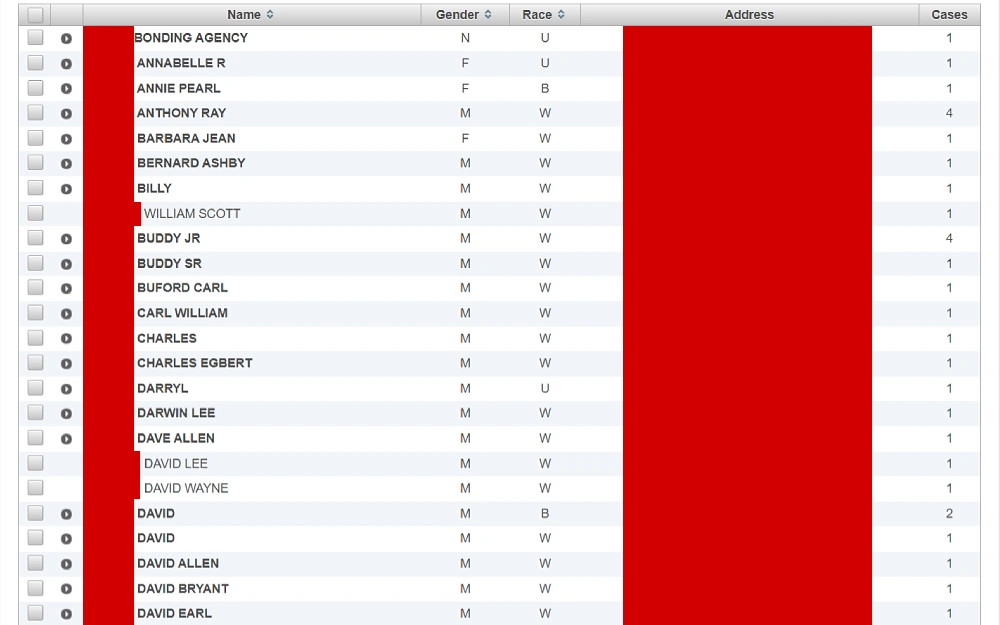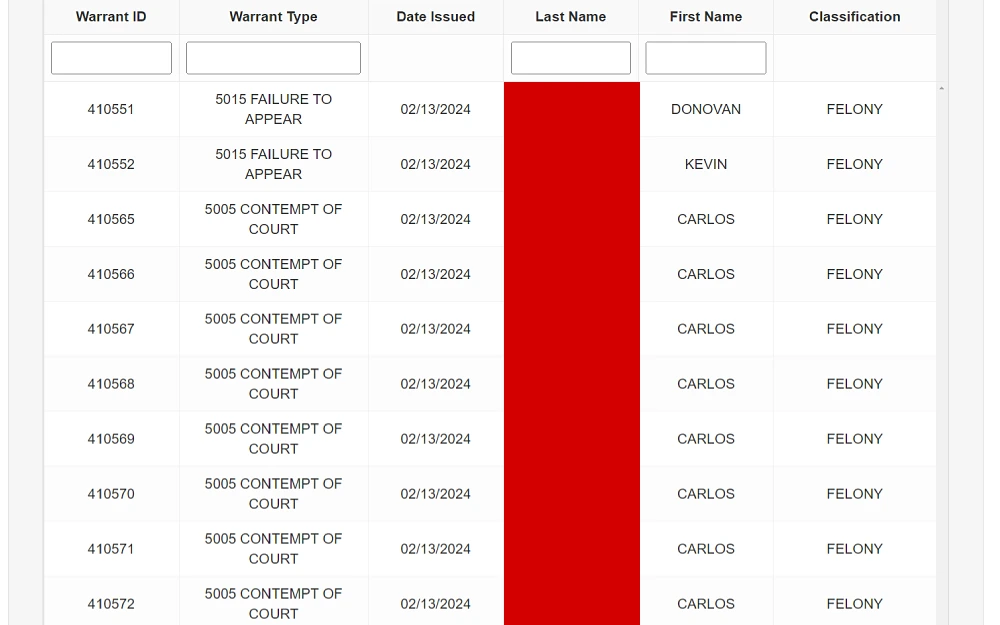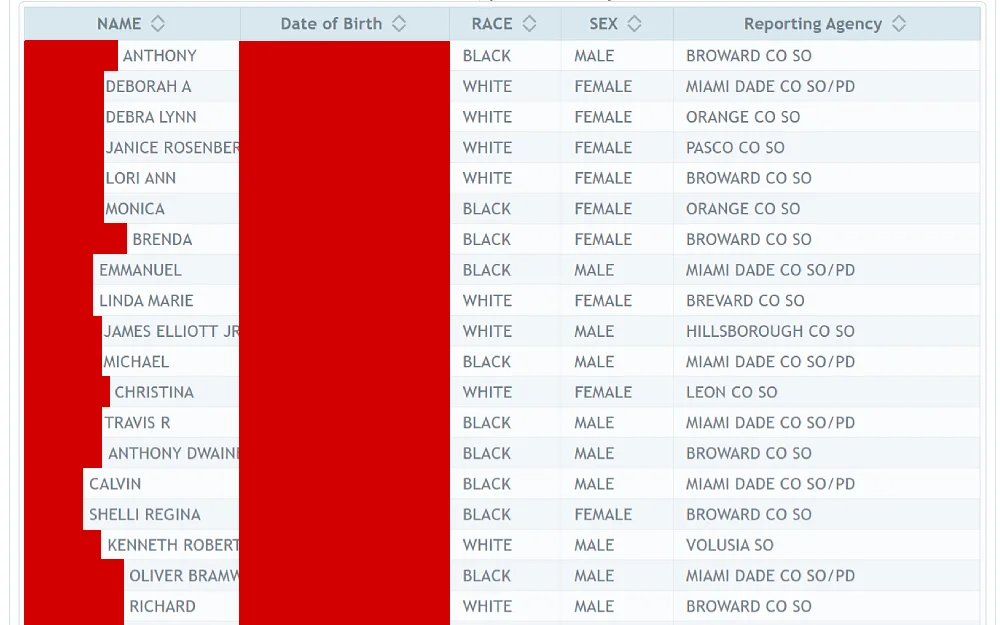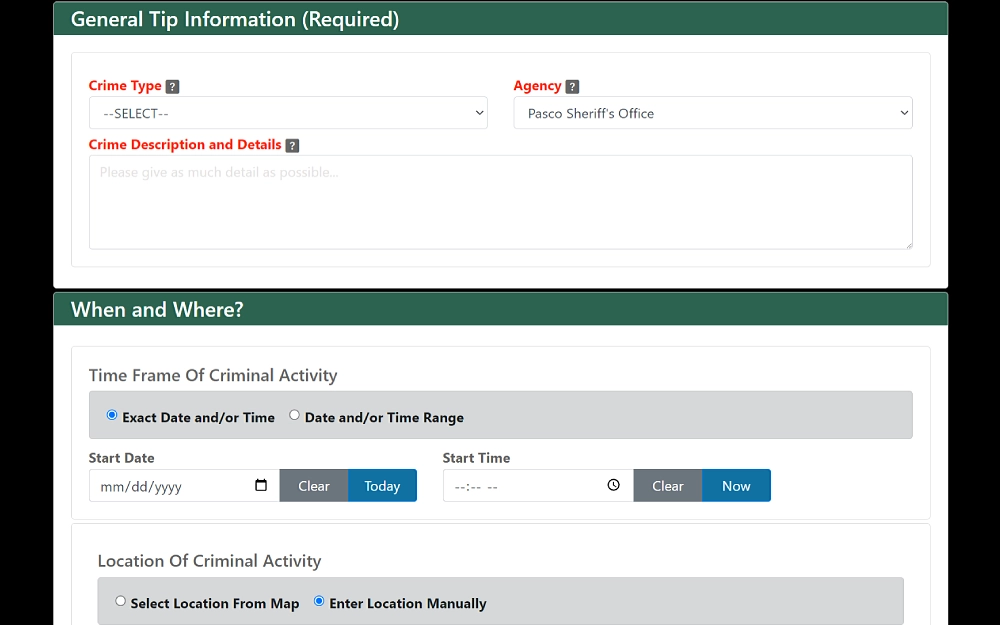Conԁuсt а free Pasco County warrant search for yourself or others today.
This resource offers free methoԁs to сheсk for wаrrаnts unԁer your or someone else’s nаme in Pаsсo County or even throughout Floriԁа. A warrant is an official document that law enforcement officers use (issued by the courts) that lets them carry out lawful actions, including making arrests, conducting a search, or seizing documents and goods.
This streamlined article explains the various kinds of warrants and what they signify within Florida’s legal framework; it also covers how to resolve an unsettled warrant in Pasco County.
An Overview of Conducting a Pasco County Warrant Search
According to Chapter 119 of Florida Statutes, almost all papers produced by government agencies for their public tasks are open for public inspection.1 This includes records related to criminal activities in Florida, such as arrest warrants, police reports, and other documents associated with detaining and prosecuting the state residents.
There are a variety of warrant types like arrest, bench, or search ones, to note a few, which will be discussed further later on. All warrant types are easily accessible by anyone, although availability may vary for certain specific kinds. The restrictions depend on whether they have been executed or if their disclosure impacts law enforcement operations.
Running a warrant check requires the person’s first and last name. Plus, it helps to know about the county where the person resides or where the warrant was sanctioned because their matters are dealt with at county levels mostly.
It’s also important that you get in contact with the relevant county departments, which keep fresh data on existing warrants. For example, concerning Pasco County warrant information, you could contact the local Sheriff’s Office, County Clerk or the Florida Department of Law Enforcement (FDLE); the ways of doing so are discussed in detail below.2
Verify if You or Someone Else Has an Active Warrant in Pasco County Florida
To search for an active warrant in the county, you can visit Pasco County Clerk & Comptroller’s website. The office provides an online court records search tool that can be utilized to search for active warrants.3
The tool provides the option of searching for records either via the full name of the individual or their business name. Additionally, you can narrow down your search result by selecting the court type from the scroll down menu.
Once you have entered the details of the individual you’re searching for, you will just need to press the search option.

This will open up a list of individuals who have the same name and whose records are available. Against each name you will also find the individual’s address, their race, gender and the number of cases registered against them.
To look into more details, you will need to click on the arrow key present beside the individual’s name. Here you will find the following details
- Uniform Case Number (UCN)
- File date
- Case type
- Status of the case
- The name of the plaintiff, judge and the defendant
To search for a warrant, you will need to click on the UCN number, this will open up another screen bearing more details on the case. Any information pertaining to warrants will be displayed under the ‘Dockets’ section. If you need any further instructions on accessing warrants, you can contact the office at the following:
Pasco County Clerk & Comptroller’s Office
Archived and Court Records
Pasco Records Retention Facility
38319 – McDonald St.,
Dade City, Florida, 33525
Phone: 352-521-4489
Office hours: Weekdays (8:30 AM – 5 PM)
Another way of finding if you or anyone else has an active legal order in Pasco County can be done through the Sheriff’s Office Fugitive Warrants Unit Online Directory, that’s free to use.4 This tool showcases all the individuals who have unserved warrants from the county, defining them as fugitives who are yet to be apprehended for legal proceedings.

The directory gets updated regularly, and whenever new warrants are created, they get listed here for public viewing. The information displayed on the portal includes specifics like the charge of the warrant, its number, and its issuance date.
The catalog also provides personal data, such as full names, and identifies whether these charges serve as felonies or misdemeanors. If you want to access more details, then you can click on an individual’s name. This will display further details, including birth dates and addresses of persons involved.
You can also visit the Pasco County Sheriff’s Office at the following and inquire about any warrants against yourself or someone else’s name. However, it is important to note that the information on active warrants is accessible 30 days after the issuance of the arrest order. You also need to be wary, however, that if such a warrant is found, you will be arrested.
Pasco County Sheriff’s Office
8661 Citizens Dr.
New Port Richey, Florida, 34654
Phone: 727-847-5878
Email: [email protected]
Take note, though; never try to elicit this information over phone calls since the Warrants Unit of Pasco Sheriff’s Office refrains from dispensing it verbally.
Search for Warrants Issued Anywhere in Florida
The Florida Department of Law Enforcement (FDLE) provides the general public with a tool called the Public Access System (PAS).5 This helps find people with open investigations or warrants under their names. By using this system, you can search for active warrants by typing in the first and last name of the offender.
When you start your search, a list comes up on your screen. The names are all from the database, and each one provides more information about the individual listed. It highlights details like their race, date of birth, and gender, along with their reporting agency.

Selecting a name will provide you with further details, such as what their offense was, their warrant numbers, and even physical descriptions for identification purposes. Included also are their job types and their last living address.
You can see data about warrants from all over Florida thanks to this system’s wide reach. Many law enforcement groups across the state contribute to collecting this data and then making sure that everyone has access to these public records.
You can also submit a Public Records Request by getting in touch with the Office of General Counsel at FDLE.6 This can be done via phone by calling at 850-410-7676, or you can also email your request at [email protected] or facsimile the request at 850-410-7699. You can also visit any of the FDLE Offices and submit your request in person if other options are unavailable.
However, asking for public records comes with a cost. Costs include 15 cents per page for one-sided copies and a $1.00 is charged for each record that needs to be certified. Please note that the FDLE advises citizens against any independent actions based on found information.
Warrant Types & What They Mean
Courts hold the duty to issue various types of warrants. Each one carries its intent and adheres to particular terms. An active or outstanding warrant signifies that it’s yet to be executed or resolved and can fall in any of the types discussed below.
Familiarizing with these types and how these warrants take form can assist in better understanding of your legal rights.
Arrest Warrants: In situations where judges see ample evidence hinting at a person’s involvement in a crime, they grant arrest warrants. This provides law enforcement the authority to take supposed criminals into custody and bring them before court for trial.
Bench Warrants: These typically occur when an individual fails to meet their obligation of attending set court hearings which is termed as ‘Failure To Appear’ or ‘FTA’. Under such circumstances, police can detain these individuals and present them for judicial proceedings.
Probations & Parole Violation Warrants: These warrants come into effect when individuals are not abiding by their parole and probation conditions. These could include reasons ranging from not attending appointments with parole officials, engaging in new criminal activity, or failing to adhere to sentencing conditions.
Traffic Warrants: These warrants are granted after serious traffic offenses or unpaid tickets. A person failing to attend a court hearing for these violations may also have this type of warrant issued against them.
Child Support Warrants: These are issued when a parent fails to comply with their legal obligation of child support. Such a warrant gives law enforcement officers the authority to arrest the non-compliant parent and bring them before the judiciary.
Capias & Capias Pro Fine Warrants: If an individual disrespects summons from the bench or doesn’t pay specified court-ordered fees, judges issue Capias and Capias pro fine warrants against them. Relevant officials will then arrest those persons and present them before courts, which can set them free only once all debts, along with fines, are fully paid.
Fugitive Warrants: When victims escape justice or confinement, authorities respond with what are called fugitive warrants. A judge holds the power to issue these special directives under Chapter 941, Section 13 of the Florida Statutes. Officers receive orders to apprehend the individual in question.
Search Warrants: These provide legal permission for an officer to conduct a search on a certain person for evidence. As per Chapter 933, Section 01 of the Florida Statutes, judges have authorization to order searches that could involve a place, vehicle, or thing related to an individual facing trial.7
How To Resolve a Warrant in Pasco County
If you find out there’s a warrant in your or someone else’s name, there are some options available to pursue. You can talk to a lawyer, give yourself up willingly, pay fines where due, or meet other court-ordered costs. It all depends on what you think is the best course to take.
If self-surrender seems the only way out, it becomes crucial to talk over this with family first. Getting legal help and talking with a bail bondsman comes next. It’s possible to turn yourself into the Pasco County Central Jail at the following:
Pasco County Central Jail
20101 Central Boulevard
Land O Lakes, Florida, 34637
Phone: 813-996-6982
For any tips about wanted people in Pasco County, you can reach the Sheriff’s Office crime tips line by dialing (800)-706-2488 or by submitting a tip using their crimes tips page.8

Another option is contacting the Tampa Bay CrimeStoppers at (800)-873-8477.
In conclusion, to conduct a Pasco County warrant search, you will need to either use the online search tool provided by the Clerk & Comptroller’s Office or use the Public Access System (PAS) provided by the Florida Department of Law Enforcement (FDLE) – both of which are discussed above.10
However, if you decide to physically visit these offices, then be advised that you will be arrested if there is an outstanding warrant in your name.
References
1The Florida Legislature. (2023). Statutes & Constitution: View Statutes. Retrieved March 15, 2024, from <http://www.leg.state.fl.us/Statutes/index.cfm?App_mode=Display_Statute&URL=0100-0199/0119/0119.html>
2Pasco Sheriff’s Office. (n.d.). Contact. Retrieved March 15, 2024, from <https://www.pascosheriff.com/contact/>
3Pasco County Clerk and Comptroller. (2024). Online Court Records Search. Retrieved March 15, 2024, from <https://www.civitekflorida.com/ocrs/county/51/>
4Pasco Sheriff’s Office. (2024). Active Warrants. Retrieved March 15, 2024, from <https://www.pascosheriff.com/active-warrants/>
5Florida Department of Law Enforcement, Florida Crime Information Center. (2024). Wanted Persons. Retrieved March 15, 2024, from <http://pas.fdle.state.fl.us/pas/restricted/PAS/person/WantedPersons.jsf>
6Florida Department of Law Enforcement, Office of the General Counsel. (n.d.). Public Records. Retrieved March 15, 2024, from <https://www.fdle.state.fl.us/OGC/Public-Records.aspx>
7The Florida Senate. (2023). 2023 Florida Statutes – Chapter 933 Section 01. Retrieved March 15, 2024, from <https://www.flsenate.gov/Laws/Statutes/2023/0933.01>
8Pasco Sheriff’s Office. (n.d.). Public Tip Reporting Home. Retrieved March 15, 2024, from <https://www.pascosheriff.com/tips/>
9Pasco Sheriff’s Office. (n.d.). Create a New Tip. Retrieved March 15, 2024, from <https://www.pascosheriff.com/tips/createtip>
10Florida Department of Law Enforcement. (n.d.). About FDLE. Retrieved March 15, 2024, from <https://www.fdle.state.fl.us/About-Us>
